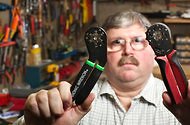Dashboard
A weekly roundup of small-business developments.
 John Gress for The New York Tim Dan Brown, inventor of the Bionic Wrench.
John Gress for The New York Tim Dan Brown, inventor of the Bionic Wrench.
Editor’s Note: Gene Marks’s weekly roundup of small-business news will return next Monday.
Two weeks ago in my Dashboard roundup, I linked to this story about Dan Brown and his patent fight with Sears over his Bionic Wrench. As you may recall, Mr. Brown gave Sears the exclusive right to sell his patented, award-winning, made-in-America tool, and it sold quite well last Christmas. This year, however, Sears has introduced a competing, less-expensive version of the tool that is made in China.
I went back to Mr. Brown, who teaches industrial design at Northwestern University and who has already enjoyed one outpouring of support on this blog, to see whether he has had further thoughts about how he handled his invention and what he might have done differently.
Do you think the government should change patent laws to better protect small businesses? If so, what changes would you suggest?
Yes, we definitely need some changes if our country is ever going to protect our significant investments in innovation. Most people do not know it, but we have a double standard in the protection and punishment of intellectual property theft. Without going into all of the detail, the punishment for willful copyright and trademark infringement is a criminal penalty. This is a very strong deterrent for copyright and trademark infringement. The punishment for willful patent infringement is a civil case and not a criminal case. As it stands today, this piracy model for patent theft allows infringers to proceed unchecked for years in the marketplace, often destroying the market, business, and investment of the patent rights owner. The current system forces the victim to fight a protracted and expensive legal battle. If Congress were to simply make those cases of willful patent infringement a criminal case, and we began holding the responsible individuals and officers of the companies personally accountable — as it is in willful infringement of copyrights and trademarks — I believe these infringers would think long and hard before they risked infringing a patented product.
What advice would you offer others who find themselves in the same situation?
My general advice to inventor-entrepreneurs is to be sure you have good intellectual property, and that you have designed your product so that it has created new value and many competitive advantages for your customers.
Would it make more sense for you to ignore Sears and instead invest your time and effort into competing with them by selling your wrench to other outlets?
We did not commit our lives to this project only to have it stolen from us without a fight. Not being able to fight for our rights and win is exactly what the piracy model is counting on.
Will it be easy to replace the business from Sears?
Sure, how many truckloads do you want to buy? Of course, we are aggressively pursuing other opportunities. Unfortunately, the sales cycle in this business runs well ahead of the delivery cycle. Pioneering a new product into a retailer is very challenging, especially when attempting to convince a buyer whose paradigm is almost totally based on purchasing imported products at very low costs. That is why we worked so hard with Sears to prove the viability of the product and sales program.
Given the low cost of manufacturing elsewhere in the world, why did you choose to manufacture in the United States?
Ironically, I have been called crazy for trying to make a product in this category in the U.S. I can understand why some people think this; we certainly did not take the easy path with the Bionic Wrench. We are also committed to doing the right thing socially. Again, this may sound crazy for a businessperson to recognize that he has a social responsibility beyond his need to create and sustain a business. However, this is precisely why we chose to produce the Bionic Wrench in the States. What drives this passion in me is that I was raised by blue-collar parents, who worked extremely hard to provide a decent life for our family. We did not have a lot of money, and we were not raised to value money higher than ethics. We were raised to do the right thing.
If cheaper products can be made elsewhere that benefit the American consumer, why not let the marketplace decide?
The right thing to do is to enforce innovation rights. These rights create jobs, economic benefits and profits for our society, while our patent-piracy tolerance destroys the economic benefits we seek. If a product like ours — a patented, award-winning innovation and an American-made business model — is destroyed by the cannibalistic capitalism of our marketplace, what products can survive to create jobs in our society? Simply, if we cannot produce innovative products domestically, what products can we produce domestically?
How has this experience affected you emotionally and physically?
I do not wish this experience on anyone. I have devoted 10-plus years of my life to this project. This is the single most deplorable ethical and business situation I have been in, and I have been working in business for over 30 years. Emotionally, I am mad, and physically I am ready to fight.
Gene Marks owns the Marks Group, a Bala Cynwyd, Pa., consulting firm that helps clients with customer relationship management. You can follow him on Twitter.
Article source: http://boss.blogs.nytimes.com/2012/11/26/following-up-with-dan-brown-inventor-of-the-bionic-wrench/?partner=rss&emc=rss